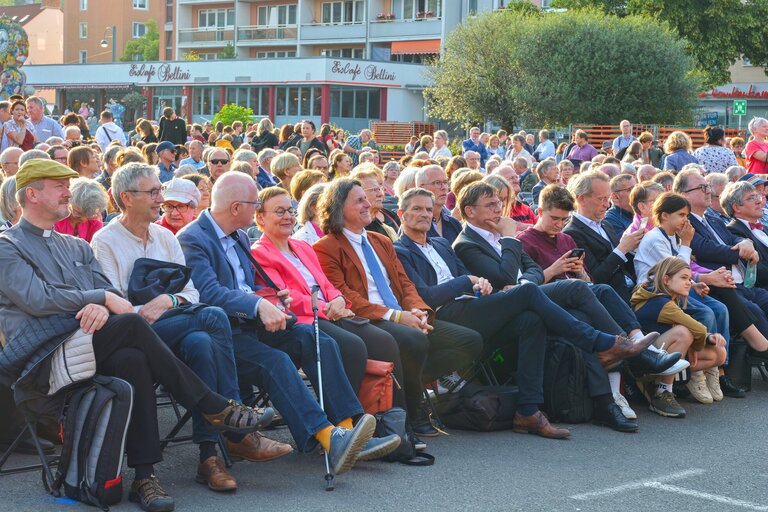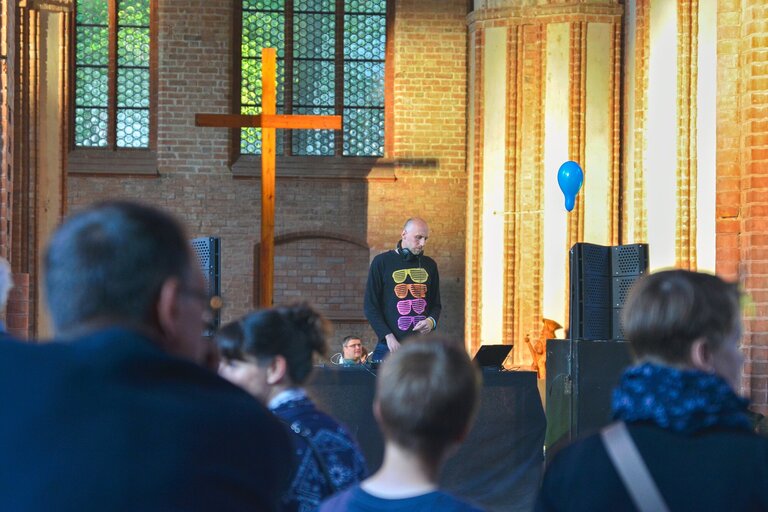The “Gathering of Christians” promoted the idea of unity in diversity
As many as 4,500 Christians from Central and Eastern Europe headed to the borders of Germany and Poland in early June. The cities of Frankfurt am Oder and Słubice, which lie on opposite sides of the Oder River, hosted the International Christian Meeting Days from 6 to 9 June 2024.
Three days full of culture, education, spirituality and an interesting accompanying programme. That would be a brief summary of this year’s Christian Meeting Days – a meeting that should serve as proof that faith overcomes borders of states and nationalitites. This symbolism was all the more pronounced this year as the host cities were Frankfurt on the Oder and Słubice, a Polish-German twin town situated on opposite banks of the Oder River.
Nothing will separate us?
The choice of location also resonated with this year’s topic: “Nothing can separate us”. The original verse from the Bible (“nothing will be able to separate us from the love of God that is in Christ Jesus our Lord,” Romans 8:38–39) gained a tangible aspect in this geographical setting. The barrier between the two cities, the border river, is overcome by a bridge that connects both the cities, states and nations like a safety pin.
This year’s edition was also special because the Christian Meeting Days returned to their “cradle”. It is in the nearby Görlitz that the first meeting of this kind took place in 1991. Bak then, it was organised by the now defunct Evangelical Church of Upper Silesia (EKSOL), which invited its partner churches in Poland and the former Czechoslovakia to Görlitz. And it was the church operating in this region, today’s Evangelical Church of Brandenburg and Upper Lusatia (EKBO), that was (this time together with the Evangelical Church of the Augsburg Confession in Poland) the organizing church this year.
Christian Meeting Days take place on a regular basis, approximately once every three years. However, the last time Central European Christians met in this way was eight years ago, in 2016, in Budapest, Hungary. The 2020 edition, which was to be held in Graz, Austria, did not take place because of the COVID-19 pandemic.
Perhaps that is why the Bishop of the Evangelical Church in Poland, Jerzy Samiec, emphasized the social dimension of this ecumenical event: “The meeting of Christians on the theme 'Nothing can separate us' is of special significance for several reasons. First of all, meeting people in person is very important. In a world where opinions are getting more and more polarised, we need a unifying element.” Bishop Christian Stäblein, one of the leaders of EKBO, made a similar statement: “We are meeting at a time of crisis. War is raging in many places, including Europe. Conflicts are dominating the news, clashes are escalating, and there is no solution in sight. Here in Frankfurt and Słubice, things should be different. We are seeking dialogue, trying to find solutions to questions for which there are no easy answers. [...] Nothing should divide us, one from another.”
The idea of unity in diversity was also supported by one of the activities that this year’s organisers prepared for all the participants. Each of the registered visitors, together with their tickets, received a wristband in a certain colour, which differed according to the country they came from. For example, visitors from the Czech Republic had yellow wristbands, while Germans had light purple wristbands. Participants from different countries could exchange bracelets - to symbolically wash away geographical distance and language barriers. As Bishop Stäblein said, we may speak different languages, but we are all one - God's people.
Spirituality, culture, and the kilometre-long table. The programme offered many possibilities to choose from
The varied and busy programme was dominated by open-air joint services in Frankfurt’s central square on Friday and Sunday. The joint dinner on Saturday, entitled “Feeding the 4000”, was another highlight. Right in the city streets, visitors had the chance to sit down at a kilometre-long dining table. In addition to eating together, they were able to share experiences and faith with Christians of other churches or nationalities. Participants could also take advantage of the varied accompanying programme – for example, try out Guttenberg’s book printing, watch a show of Hungarian folk dances, or attend a concert.
The Christian Meeting Days were also attended by significant personalities of Central Europe’s church life. Many of them are also well known in our own church, such as the General Secretary of the Fellowship of Evangelical Churches in Europe (GEKE) Mario Fischer, the General Secretary of Gustav-Adolf-Werk (GAW) Enno Haaks or the twenty-eight year old President of the Synod of the Evangelical Church in Germany (EKD) Anna-Nicole Heinrich.
A cluster of languages and nationalities. Czechs were also present among the Christians of the “Visegrad Four”
The Czech footprints in the programme included the well-attended and very unusual techno service led by the ECCB’s pastor from Třebenice, Jiří Šamšula, and the Saxon bishop Tobias Bilz, or the concert of the ECHO Zlín choir under the baton of our church cantor Ladislav Moravetz. The guests of one of the panel discussions were, among others, the Synodal Senior of the ECCB, Pavel Pokorný, and the Hussite bishop Lukáš Bujna. The offer also included a screening of the recently released film “Rainbow-coloured Faith” by young Czech filmmaker and member of the Czechoslovak Hussite Church Tobiáš Frýdl. Among the performers was also the bishop of the Silesian Evangelical Church of the Augsburg Confession and acting president of the Ecumenical Council of Churches, Tomáš Tyrlík, who spoke in one of the panel discussions and concelebrated the closing service.
Of course, representatives of local governments are aware of the Gathering of Christians, and so is the media. Such a social impact is unprecedented on a domestic scale.
With a bit of exaggeration, the character of this event could be briefly described as a meeting of the “Visegrad Four”. Those for whom German presents a language barrier can enjoy a number of programmes in other languages. Also, given the Slavic proximity, Czechs are able to understand several languages with no language training whatsoever. The exception to this rule is Hungarian, which is extremely difficult for people speaking Slavic languages as well as for Germans.
Next stop: Czech Republic
The next edition of the Meeting will have an even stronger Czech footprint than this year’s. In 2027, the Christian Meeting Days will move to the Czech Republic. The preparations are at their very outset; so far, it has not even been decided which city will host the event. However, it is highly likely to be Prague. For now, it is already clear that the ECCB will be the organising church. That is why Synodal Senior Pavel Pokorný received the symbolic “organiser’s baton” from bishop Stäblein already in Frankfurt.
We thank all the donors who contributed to the Czech participation in the 2024 Christian Meeting Days in Frankfurt/Oder and Słubice:
Czech/German future fund
Věra Třebická-Řivnáčová Endowment Fund
Kirchen helfen Kirchen
Chorverband in der Evangelischen Kirche in Deutschland





